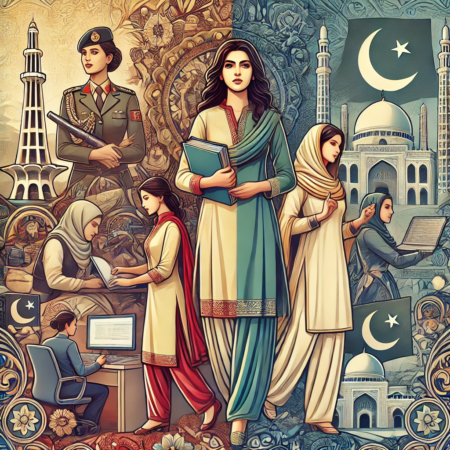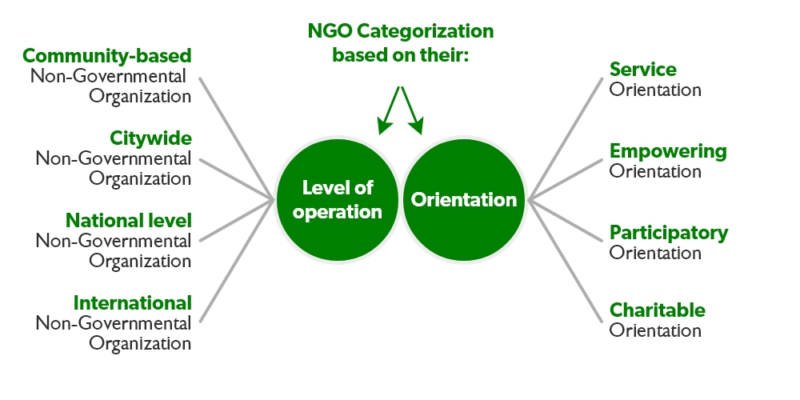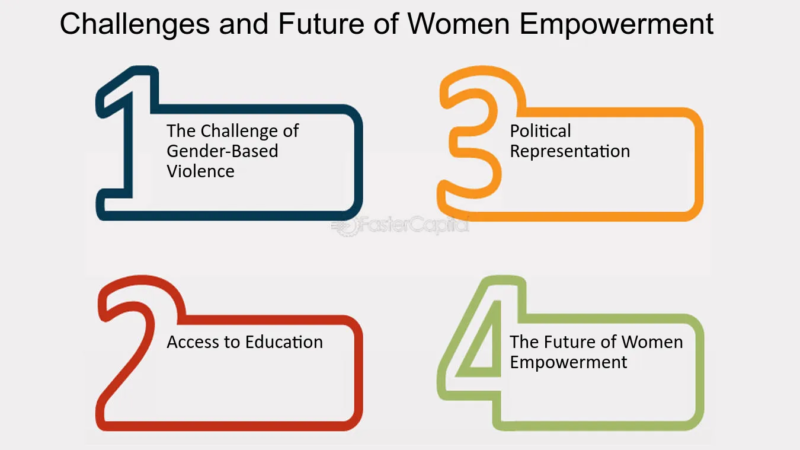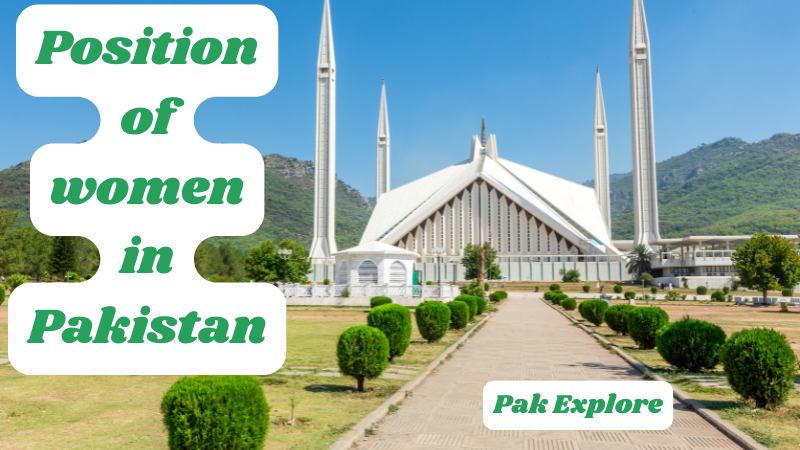Position of women in Pakistan
Introduction
The position of women in Pakistan is a crucial topic, encompassing various social, cultural, religious, and economic factors. Over time, women in Pakistan have made significant strides and continue to progress in fields such as politics, education, economy, and media. Despite these advancements, the position of women remains challenging, as women still face gender discrimination, societal restrictions, and cultural obstacles that hinder their full potential. The ongoing changes in the position of women in Pakistan reflect both progress and the need for continued efforts to overcome these challenges.

Table of Contents
Historical background
The role of women in Pakistan has always been significant throughout history. Women have actively participated in the Pakistan Movement, and Quaid-e-Azam Muhammad Ali Jinnah recognized the importance of women, including them in the movement.
Fatima Jinnah, the sister of Quaid-e-Azam, dedicated her life to serving the Muslims of the subcontinent, and many other women also contributed to the nation with their talents and hard work. Even after the creation of Pakistan, the role of women has remained vital, as women have continued to serve in various fields, and this progress continues today.
Place of women in education
Access to education for women in Pakistan has been a major problem, but has improved over time. In urban areas, girls are getting education and going into various professional fields. In contrast, in rural areas, lack of education and cultural barriers still stand in the way of girls’ education. Women of Pakistan have achieved many achievements in the field of education. The number of girls in various schools, colleges, and universities is increasing, and they are honing their talents at the national and international levels as well.
The government has introduced various programs for the promotion of girls’ education and NGOs. Also working on various projects regarding women’s education. Yet, in some areas, lack of educational institutions and cultural restrictions are barriers to girls’ education. If these issues are addressed, further improvements can be made in women’s education, which will pave the way for them to succeed in future prospects.
Women’s participation in the economic sector
The role of women in Pakistan’s economy is important. Pakistani women work in agriculture, handicrafts, small businesses, and other industrial sectors, however, their participation in the economic sector is limited and they are often underpaid. In urban areas, women are working in various institutions, while in rural areas most women work in the informal sector, where their rights are not protected and they are often paid less.

In recent years, Some women have also ventured into business and industry and established various start-ups and enterprises. The government has launched various programs to promote women in business, such as loans for women, but cultural restrictions and traditional thinking still stand in the way of women’s advancement.
Social and cultural issues
Pakistani society has traditional and cultural values, and these values often restrict women. Women in rural areas especially face social restrictions. They are not given the opportunity to make their own decisions in matters of education marriage, and job and are often subjected to family pressure This social structure becomes a major obstacle in their way of development.
Social problems in Pakistan also prevent women from progressing. Because of gender discrimination, women are often given fewer opportunities than men, and do not enjoy the same freedoms that men are afforded. In some areas, women still face problems such as forced marriage and early marriage, which limit their life chances.
Health and safety
Women’s health issues are also a major challenge in Pakistan. Most women in rural areas do not have access to basic health facilities, especially maternal and child health services. In such areas, women do not have access to quality medical facilities, which negatively affects their health. Gender-based violence is also a major problem.

Women face various forms of violence such as domestic violence, honor killings, and sexual harassment. The government has enacted laws against violence, but their implementation is lacking. Non-governmental organizations and human rights organizations are trying to address these issues, but violence against women is still a major challenge in society.
Legislation regarding women’s rights
Various laws have been made in Pakistan to protect the rights of women. There are laws against domestic violence, child marriage, and sexual harassment in the workplace. The purpose of these laws is to give women their rights and free them from social pressure. In addition, there are laws for women’s rights in inheritance, so that they get their share of property.
However, these laws are poorly enforced, and in many places they are not respected. Often cultural and traditional thinking hinders the implementation of these laws. There is a need to create awareness at the community level to recognize women’s rights and ensure implementation of these laws.
Participation of women in the political arena
Women position have also played an important role in politics in Pakistan. Ms. Benazir Bhutto, the first woman Prime Minister of Pakistan, set an example for women in the country’s politics. In various political institutions of Pakistan, specific seats have been allocated for women, so that they can get full opportunity in politics.
Women position have also raised their voices in local governments, provincial and national assemblies. However, women face various challenges in the political arena, such as male dominance, cultural barriers, and family pressure. Women often need the support of their families to advance in politics and face many obstacles.
Role of women in mass media
Position of women in Pakistan have also played a crucial role in the media. Through television, radio, and social media, women in Pakistan have raised their voices and shared opinions on a wide range of topics. Women journalists, hosts, and actresses have carved out their space in Pakistani media, and their contributions are bringing significant attention to social issues. The presence and influence of women in media continue to grow, as they actively shape conversations and bring change to societal perspectives.
However, women working in the media also face issues such as sexual harassment and discrimination. Women in various media organizations face these issues, and they have to work hard to protect their rights.
Women’s Rights Non-Governmental Organizations (NGOs)
Various non-governmental organizations are also active for women’s rights in Pakistan. These organizations work for women’s education, health, and legal rights and try to free them from social and cultural restrictions. These organizations have played an important role in creating awareness and helping women.

Non-governmental organizations play a vital role in creating social awareness, educating women about their rights, and offering support. These NGOs have made significant efforts to raise awareness among women and inform them about their rights. Through their initiatives, non-governmental organizations have empowered women and promoted the importance of gender equality, which directly impacts the position of women in society. However, these NGOs often face social pressure and, in certain areas, government restrictions that hinder their efforts. Despite these challenges, the work of non-governmental organizations continues to be instrumental in advocating for the position of women and improving their status in society
Progress and future prospects of women
Position of women in Pakistan have made significant progress in the last few decades. Further improvements are needed in the education and health sector, so that women are aware of their rights and can participate fully in the social, economic, and political spheres.

Recognizing their rights and providing them opportunities for development will not only raise the status of women but will benefit the entire society. If you play your role in ensuring that a bright future can be created for Pakistani women.
The result
The position of women in Pakistan is a complex blend of both progress and challenges. Over the years, the position of women in various sectors such as education, business, and politics has seen notable improvement. Pakistani women have made significant strides in these fields, breaking barriers and proving their capabilities. However, despite these successes, the position of women in Pakistan continues to face numerous challenges. Gender inequality, social restrictions, and cultural barriers still affect the advancement of women, hindering their full potential. While the position of women in Pakistan has certainly evolved, there is still much work to be done to achieve true equality and empowerment
_______________


